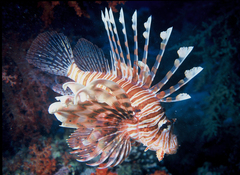
pest [pĕst] noun
_________________________________________________________________________
1. An annoying person or thing
2. An insect or small animal that destroys food, crops, livestock, trees, etc.
_________________________________________________________________________
The lionfish is from the South Pacific and Indian Oceans. Recently, it has begun invading the waters of the Atlantic Ocean.
No one is sure how the first lionfish got into the Atlantic Ocean. In 1992, Hurricane Andrew swept through Florida and at least six lionfish escaped from a broken aquarium near the beach. Lionfish owners may have released more lionfish that they no longer wanted. Since then, lionfish have been spotted from Massachusetts to Venezuela.
The lionfish is venomous. It has sharp spikes on the top and bottom of its body. It uses these to sting predators. When it stings, the lionfish injects venom into your flesh that can cause searing pain which can last for days. The venom can even cause breathing problems or paralysis.
This map shows all the reported lionfish sightings from 1985–2017.
Lionfish are a problem because they have no natural predators in the Atlantic Ocean. Without predators to keep the lionfish population in check, the lionfish have begun to take over.
Lionfish are pests. They eat and destroy the natural habitat of native animals. They are eating machines. They happily devour baby fish, lobster, crabs, and other reef animals. Reefs across the world are already in grave danger. Pollution and climate change threaten them. And now they are in danger because of lionfish. Hundreds of types of fish live in a single reef. Baby fish, in particular, live and hide in reefs— and they are the lionfish’s favorite meal. The baby reef fish may be tiny now, but some grow to be giant fish like grouper. When a single lionfish moves into a reef, it reduces the reef’s population by 80 percent.
What’s worse is that lionfish eat baby fish that are very important to the survival of coral reefs. They love to eat baby parrotfish. Parrotfish eat algae. Algae are microscopic plants. If too much algae grows, it uses up all the oxygen in the water. This kills the reef. Without the parrotfish, the reefs are doubly doomed.
Lionfish also eat fish that we eat. They eat the baby fish in fisheries. They also impact commercial fishing. These are big fishing boats that catch the kinds of fish you buy in the supermarket. The lionfish reduce the number of adult fish in the water. That means there are less fish for people to eat.
How can we stop the spread of the lionfish? By eating them! Apparently they are delicious. Scientists think that if more people want to eat lionfish, more fishermen will fish for them. So fisherman can make money and save the coral reefs at the same time. Another way is to hold lionfish hunting competitions. This means that divers compete to see who can spear the most lionfish.



 About BeeLine
About BeeLine